|
|
|
Sort Order |
|
|
|
Items / Page
|
|
|
|
|
|
|
| Srl | Item |
| 1 |
ID:
185227
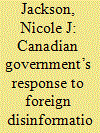

|
|
|
|
|
| Summary/Abstract |
In recent years, governments have considered how to respond to “disinformation.” However, there is little academic literature on Canada’s response in the area of security and foreign policy. This paper addresses this gap by analyzing how and why Canadian government foreign and security actors have “securitized” foreign disinformation. It argues that, since 2014, they have increased awareness about disinformation and transformed it into a matter of “security” through rhetoric and discursive framing, as well as stated policy intentions and actions. This has occurred in response to perceived threats, but without coherent policy. The findings suggest that challenges are linked to persistent difficulties in defining and understanding disinformation. The result has been fragmented actions, some of which may legitimate actions that deviate from “normal political processes.” The implications are that definitional challenges need to be addressed, the role of security actors assessed, and a clearly articulated and holistic strategy drawn.
|
|
|
|
|
|
|
|
|
|
|
|
|
|
|
|
| 2 |
ID:
192045
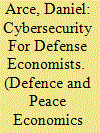

|
|
|
|
|
| Summary/Abstract |
Cybersecurity plays a role in national security. This study introduces cybersecurity concepts in ways familiar to defense economists and identifies parallel methods of analysis in the fields. The theoretical tools of both fields include microeconomics and game theory. These tools enable analyses of phenomena present in both milieus: public goods, externalities, commons, incentives, interdependent security, platform economics, and inefficiency of decentralized decision making. Additional topics include cyber war, cyberterrorism, deterrence and disinformation in cyberspace, price of anarchy, and economics of cryptography.
|
|
|
|
|
|
|
|
|
|
|
|
|
|
|
|
| 3 |
ID:
187117
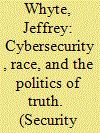

|
|
|
|
|
| Summary/Abstract |
This article explores the racial politics underwriting cybersecurity’s recent human turn toward the issues of online disinformation and ‘foreign influence’ in US politics. Through a case study of the Black Lives Matter (BLM) movement, this article’s first half considers how contemporary cybersecurity has produced ‘racial division’ as an object of security by framing the BLM movement as a geopolitical vulnerability open to foreign manipulation through social media. In its emphasis on the political protest as a site of insecurity, I argue that contemporary cybersecurity has widened its traditional spatiality ‘beyond the computer’. In the article’s second half, I argue that the racialization of cybersecurity has underwritten a politics of truth ultimately concerned less with parsing true from false, and more with defining the boundaries of secure political knowledge and communication. I argue that contemporary cybersecurity has produced an idealized subject for whom an obligation to possess contingent forms of knowledge becomes a condition of secure political subjectivity. I conclude with a critique of contemporary cybersecurity’s tendency to portray dissident political movements like BLM as ignorant or disinformed.
|
|
|
|
|
|
|
|
|
|
|
|
|
|
|
|
| 4 |
ID:
059535
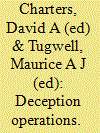

|
|
|
|
|
| Publication |
London, Brassey's, 1990.
|
| Description |
xvi, 432p.
|
| Standard Number |
0080367062
|
|
|
|
|
|
|
|
|
|
|
|
Copies: C:1/I:0,R:0,Q:0
Circulation
| Accession# | Call# | Current Location | Status | Policy | Location |
| 031401 | 327.14/CHA 031401 | Main | On Shelf | General | |
|
|
|
|
| 5 |
ID:
188707
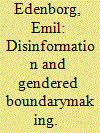

|
|
|
|
|
| Summary/Abstract |
This article examines how Russian geostrategic communication is entangled in global gender politics. The aim is to understand the resonance of disinformation in relation to culturalized, ethnicized and racialized narratives of gender, or “gendered boundarymaking.” The analysis is based on focus group discussions with Swedish, Danish, and Norwegian individuals, asked to share their impressions of news articles from the Russian media agency Sputnik, which all depicted Sweden as a warning example of multiculturalism and feminism gone “too far.” In the discussions, participants opposed a gender equal “self” to a patriarchal immigrant “other,” narrated Sweden as a country exceptionally concerned with gender, and tapped into competing temporalities of progress and decline. The article contributes to research on geostrategic communication by showing how disinformation efforts draw upon gendered national identities and debates about gender and immigration. More importantly, the article demonstrates that such gendered boundarymaking shapes audiences’ interpretations in crucial ways. Rather than viewing disinformation only from a state-centered lens of national security, in isolation from racism, Islamophobia, anti-feminism, and queerphobia within Western societies, research should acknowledge the interconnections between geostrategic communication and everyday boundarymaking. This will be pivotal to developing counterstrategies to disinformation, whether Russian or homegrown.
|
|
|
|
|
|
|
|
|
|
|
|
|
|
|
|
| 6 |
ID:
165333
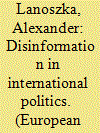

|
|
|
|
|
| Summary/Abstract |
Concerns over disinformation have intensified in recent years. Policymakers, pundits, and observers worry that countries like Russia are spreading false narratives and disseminating rumours in order to shape international opinion and, by extension, government policies to their liking. Despite the importance of this topic, mainstream theories in International Relations offer contradictory guidance on how to think about disinformation. I argue that disinformation is ineffective in terms of changing the policies of a target as regards to its foreign policy alignments and armaments – that is, the balance of power. To be strategically effective, disinformation must somehow overcome three powerful obstacles: first, the fundamental uncertainty that international anarchy generates over any information broadcasted by adversaries; second, the pre-existing prejudices of foreign policy elites and ordinary citizens; and third, the countermeasures that are available even amid political polarisation. I examine the most likely case of there seemingly being a conscious and effective strategy that emphasises disinformation: the Russian campaign that has targeted the Baltic states, especially since the 2014 annexation of Crimea. The available evidence strongly suggests that the strategic effects of disinformation are exaggerated.
|
|
|
|
|
|
|
|
|
|
|
|
|
|
|
|
| 7 |
ID:
197750


|
|
|
|
|
| Summary/Abstract |
China’s economic size and authoritarian system allow it to “enable” pariah states’ violations of international norms in Myanmar (genocide and military coup), North Korea (nuclear missile development), and Russia (unprovoked invasion of a neighboring state). The Xi Jinping leadership not only advances national interests—involving trade, investment, energy supplies, and strategic access—but also aims to counter perceived threats to and constraints on the Chinese Communist Party, weaken its American superpower rival, and reshape the international order. Beijing’s relations with Myanmar, North Korea, and Russia exhibit three enabling mechanisms: economic sanctions busting; diplomatic coordination at the United Nations; and presenting alternative narratives via state-controlled media. Although China’s strategy is costly and has produced mixed geopolitical gains, it appears focused on the long term. In response, the United States and its partners are coordinating international law enforcement, strengthening institutional cooperation, and combating authoritarian informational campaigns.
|
|
|
|
|
|
|
|
|
|
|
|
|
|
|
|
| 8 |
ID:
182963
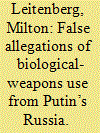

|
|
|
|
|
| Summary/Abstract |
From 1949 until 1988, the Soviet Union conducted a nearly continuous campaign of false allegations of biological-weapon (BW) use by the United States. In 1995, senior Russian military officials revived this pattern of false allegations, which continues to the present day. Russian officials amplified the campaign after the US government funded the transformation of former Soviet BW facilities in the Commonwealth of Independent States under the Nunn–Lugar program. The outbreak of the COVID-19 pandemic in China in January 2020 prompted a very greatly expanded Russian-government BW-related disinformation effort. This paper aims to present a reasonably comprehensive account of these activities and to assess their significance. The Russian government under President Vladimir Putin has demonstrated open disdain for both the Biological and Toxin Weapons Convention and the Chemical Weapons Convention.
|
|
|
|
|
|
|
|
|
|
|
|
|
|
|
|
| 9 |
ID:
188263
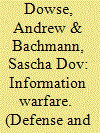

|
|
|
|
|
| Summary/Abstract |
The information age has transformed society by allowing people to interact digitally, yet it enables motivated actors to use mass influence to further their political objectives. The struggle against disinformation requires an appreciation of how a disinformation effect can be achieved in order to counter it. We consider the nature of disinformation and its use in the hybrid warfare domain, before examining the problem through frames of planning approach, truth theory, systems thinking, and military strategy. These approaches are informative in developing counter-strategies and we specifically identify the concept of kill chains as a useful framework to assist in the disinformation challenge.
|
|
|
|
|
|
|
|
|
|
|
|
|
|
|
|
| 10 |
ID:
192879
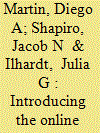

|
|
|
|
|
| Summary/Abstract |
This article introduces a dataset on the covert use of social media to influence politics by promoting propaganda, advocating controversial viewpoints, and spreading disinformation. Influence efforts (IEs) are defined as: (i) coordinated campaigns by a state, or the ruling party in an autocracy, to impact one or more specific aspects of politics at home or in another state, (ii) through media channels, including social media, by (iii) producing content designed to appear indigenous to the target state. Our data draw on more than 1,000 media reports and 500 research articles/reports to identify IEs, track their progress, and classify their features. The data cover 78 foreign influence efforts (FIEs) and 25 domestic influence efforts (DIEs) – in which governments targeted their own citizens – against 51 different countries from 2011 through early 2021. The Influence Effort dataset measures covert information campaigns by state actors, facilitating research on contemporary statecraft.
|
|
|
|
|
|
|
|
|
|
|
|
|
|
|
|
| 11 |
ID:
178560
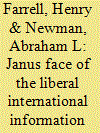

|
|
|
|
|
| Summary/Abstract |
Scholars and policymakers long believed that norms of global information openness and private-sector governance helped to sustain and promote liberalism. These norms are being increasingly contested within liberal democracies. In this article, we argue that a key source of debate over the Liberal International Information Order (LIIO), a sub-order of the Liberal International Order (LIO), is generated internally by “self-undermining feedback effects,” that is, mechanisms through which institutional arrangements undermine their own political conditions of survival over time. Empirically, we demonstrate how global governance of the Internet, transnational disinformation campaigns, and domestic information governance interact to sow the seeds of this contention. In particular, illiberal states converted norms of openness into a vector of attack, unsettling political bargains in liberal states concerning the LIIO. More generally, we set out a broader research agenda to show how the international relations discipline might better understand institutional change as well as the informational aspects of the current crisis in the LIO.
|
|
|
|
|
|
|
|
|
|
|
|
|
|
|
|
| 12 |
ID:
187734
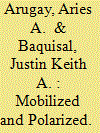

|
|
|
|
|
| Summary/Abstract |
Social media played a significant role in the 2022 Philippine national elections. Using various empirical sources, including an original pre-electoral survey, we argue that social media was critical in the production, transmission, and reception of election-related information and narratives that resulted in offline and online polarization and mobilization of Filipino voters in the 2022 elections. This article discusses the role of social media in electoral politics in the Philippines relative to other factors, such as material incentives for political partisans, prior voting behavior patterns, information consumption, and long-standing grievances. We discuss how these factors inform social media’s role in mobilizing and polarizing the Philippine electorate. We also unpack the leading disinformation narratives of authoritarian nostalgia, conspiracy theory, strongman leadership, and democratic disillusionment, which fueled support for Marcos Jr. and undermined the other candidates. In conclusion, this article discusses the implications of disinformation in the 2022 elections for the post-electoral political engagement of Filipinos and its contribution to the further political dysfunction of Philippine democracy.
|
|
|
|
|
|
|
|
|
|
|
|
|
|
|
|
| 13 |
ID:
192611
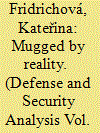

|
|
|
|
|
| Summary/Abstract |
This article discusses the surprising lack of preparedness in Russian propaganda preceding the invasion of Ukraine on February 24, 2022. Despite previous successes in developing strategic narratives during the annexation of Crimea, Russia underestimated the need for unique communication strategies for the conflict in Ukraine. The article argues that Russia's miscalculation was due to the assumption that it already had a set of strategic narratives in place, from the international order to specific issues, and viewed the conflict as a continuation of the story it had already told. However, increased scrutiny from Western media and academia led to a reexamination of assumptions and attitudes towards the region. Instead of Russia adapting its strategic narrative for a Western audience, it fell back on the existing one, further alienating the audience. This chapter highlights the importance of strategic narrative in international conflicts and its complex relationship with audience perception.
|
|
|
|
|
|
|
|
|
|
|
|
|
|
|
|
| 14 |
ID:
152693
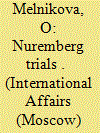

|
|
|
|
|
| Summary/Abstract |
IN PLANNING the setting up of the International Military Tribunal and an international trial of the main Nazi war criminals, the powers of the anti-Hitler coalition were guided by the principles of inevitable liability and punishment for all the Nazi criminals guilty of mass atrocities.
|
|
|
|
|
|
|
|
|
|
|
|
|
|
|
|
| 15 |
ID:
193566
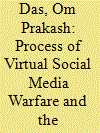

|
|
|
|
|
| Summary/Abstract |
Disinformation, a longstanding weapon in warfare, skilfully employs technological tools to deceive adversaries and secure strategic advantages. In today’s digital age, social media wields unprecedented power, overshadowing traditional media in access and technology, consequently fuelling the alarming surge in disinformation. The personalization of media content perpetuates echo chambers, stifling exposure to diverse perspectives. This insidious synergy between feedback loops and disinformation perpetuates a self-sustaining cycle, distancing us from the truth and cementing ideological divides. Social media users find themselves ensnared in this disinformation warfare, with evolving technology continually heightening the challenges we face.
|
|
|
|
|
|
|
|
|
|
|
|
|
|
|
|
| 16 |
ID:
184717
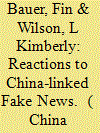

|
|
|
|
|
| Summary/Abstract |
China is accused of conducting disinformation campaigns on Taiwan's social media. Existing studies on foreign interventions in democratic societies predict that such disinformation campaigns should lead to increasing partisan polarization within Taiwan. We argue that a backlash effect, making Taiwan's citizens more united against China, is equally plausible. We conduct a survey experiment exposing participants to a real-life rumour and rebuttal to test these competing hypotheses. We find, at best, mixed evidence for polarization. Although neither rumour nor rebuttal mention China, there is consistent evidence of backlash against China. Most notably, participants across the political spectrum are more inclined to support Taiwanese independence after viewing the rumour rebuttal. These findings indicate that citizens may put aside partisanship when confronted with false news that is plausibly linked to an external actor. We conclude by discussing the broader applicability of our theory and implications for cross-Strait relations.
|
|
|
|
|
|
|
|
|
|
|
|
|
|
|
|
| 17 |
ID:
186365
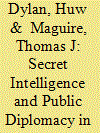

|
|
|
|
|
| Summary/Abstract |
Intelligence is generally collected and used in secret to inform internal audiences. Before and after Russia’s invasion of Ukraine, however, the UK and US governments have deployed intelligence extensively to influence external audiences, both publicly and privately, regarding Russian intentions, capabilities and practices, and the consequences of Russian actions. While the scale, manner and initially pre-emptive nature of these disclosures represent a significant evolutionary step in how liberal-democratic governments use their intelligence assets, current practice has built upon historical precedents. This article examines why states choose to use intelligence – including fabricated intelligence – for influencing external audiences; the different methods they deploy for doing so; the gains and costs of publicising intelligence; and how the use of intelligence during the Russia–Ukraine conflict should be understood within broader historical and contemporary trends. The authors conclude that while liberal democracies’ use of intelligence in public is to be welcomed for its greater transparency, careful risk management will be needed if this approach is to continue.
|
|
|
|
|
|
|
|
|
|
|
|
|
|
|
|
| 18 |
ID:
193628
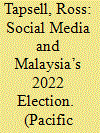

|
|
|
|
|
| Summary/Abstract |
This article argues that Malaysia’s 2022 General Election (GE15) amplified negative campaigning via new techniques associated with platform and technological advancements, led by creative innovations in campaign tactics, including livestreaming and video content. GE15 was the freest election campaign in Malaysia’s history. All political parties and coalitions enjoyed access to a wide range of mainstream and online media to disseminate content, and new platforms like TikTok emerged as influential conduits of campaign messages. Yet serious problems in this digital public sphere remain a feature of the country’s media landscape. These include cybertroopers, fake news peddlers, and those creating polarizing content around race and religious issues. This article explains how social media campaigning in Malaysia is becoming more professionalized and better resourced, inspiring some diversity and creativity, while at the same time enabling groups who spread narratives intended to incite and enrage, particularly via video content. The Malaysian case exemplifies the growing problems within the contemporary digital public sphere, showing how the professionalization of social media campaigning can lead to disinformation and, ultimately, polarization.
|
|
|
|
|
|
|
|
|
|
|
|
|
|
|
|
| 19 |
ID:
182617
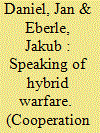

|
|
|
|
|
| Summary/Abstract |
What do we speak of when we speak of ‘hybrid warfare’, a notion that has become prominent in discussions of European security? The article shows that this question is difficult to answer, as the hybrid warfare discourse is not only vague, but also consists of multiple, and at times contradictory, narratives. While talking and writing about supposedly the same thing, participants in the hybrid warfare debate often suggest markedly different ideas about the precise nature and target of the threat, offer different responses and draw upon different expertise. Grounding our argument in critical scholarship on narratives, security knowledge and hybrid warfare, we build a framework for studying security narratives around the four elements of threat, threatened value, response and underlying knowledge. This framework is utilised in a case study of Czechia, a country that has played a pioneering and outsized role in European hybrid warfare debates. We identify three narratives of hybrid warfare – defence, counterinfluence and education – which present markedly different understandings of ‘hybrid warfare’, and ways to defend against it. Our intervention hopes to contribute to disentangling the contradictions of the hybrid warfare discourse, itself a necessary precondition for both sound state policy and an informed public debate.
|
|
|
|
|
|
|
|
|
|
|
|
|
|
|
|
|
|
|
|
|